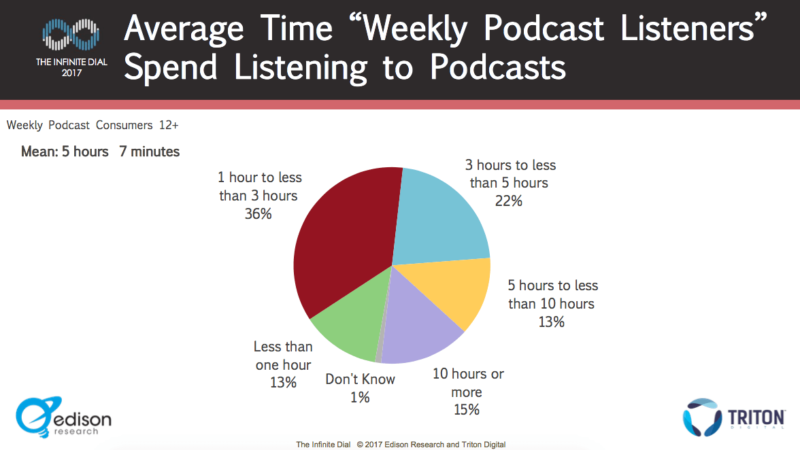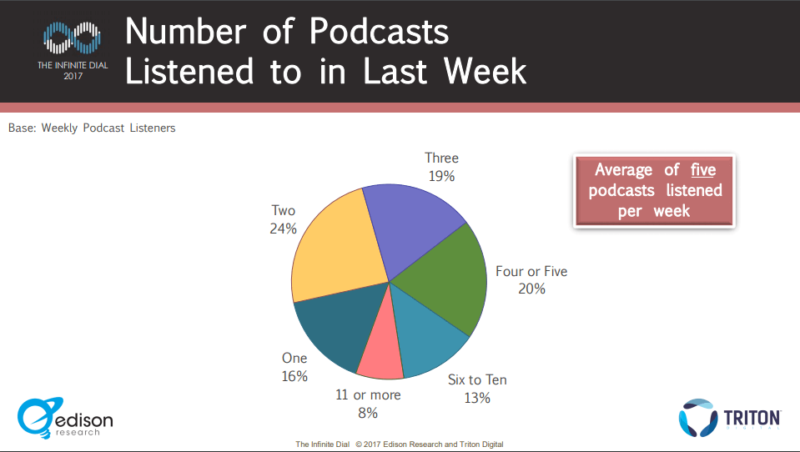
If you’re in the digital marketing industry, you know podcasts are HOT. Whether you’ve started your own or are a regular podcast listener, podcasting is a medium all digital marketers should pay attention to.
According to Edison Research, 58 percent of listeners spend one to five hours each week listening to podcasts.

Surprised at the high number? You shouldn’t be. We live in a very busy and hectic world. People are using every minute they can to multitask and learn so they stay competitive.
Listening to podcasts allows people to learn and catch up on things they’re interested in while sitting on the couch, working out, driving or on the go.
Here are some other podcast statistics from Edison Research that deserve your attention.
• An estimated 42 million Americans listen to podcasts weekly.

• The average person listens to five podcasts a week:

• 85 percent of listeners listen to all (or most of) a podcast:

• Both men and women are listening to podcasts, and the numbers are increasing for both.
This means that no matter what your interest, you can find an audience that is excited and willing to listen.
If you are a digital marketer with skills and experience that are of interest to others, rather than just listening to podcasts, you should become a guest on podcasts!
There are many search engine optimization (SEO) and reputation management benefits to guesting on podcasts. Here are some tips on how you can get an SEO and reputation boost by guesting on podcasts.
Boost SEO and your brand
Being a guest on a podcast is literally one of the most powerful SEO tactics you can use to boost your SEO rankings and build your reputation and brand.
If done strategically, it can be one of the best SEO and content marketing strategies you can use to help your rankings and attract new customers. So, don’t just give an interview on a podcast without using that interview as an SEO and brand-building strategy. Here’s how.
1. Be interview-worthy. Build yourself and your brand.
To become a guest on a podcast, you first need to build yourself and your brand as an authority in your industry or topic specialty area.
If you work for a leading company in the industry you’re interested in, you’re already ahead of the game. If you’re trying to build your personal business brand, you should start getting your name out there by:
- Guest blogging for leading industry websites.
- Speaking at local and national conferences.
- Giving webinars yourself.
- Being the expert on others’ webinars.
- Building a following on social media.
- Writing content on your site that gets significant shares and views.
- Creating videos that are watched and shared.
- Getting online reviews.
You can also help bolster your authority by making sure your website is worth visiting.
Most podcasters will tell people to visit your website for more information and will even link to your website in the show notes, so make sure your website shines. If you haven’t updated your website in two years or it looks like your 15-year-old nephew built it, fix it.
Anything you can do to show off your professional credentials on your website will help increase your likelihood of getting booked.
Do you have a Master’s degree in Internet Marketing? Do you belong to an industry association? Are you certified in a particular area? Now is not the time to be meek and mild. Show off all the amazing things you’ve done so you position yourself as an expert in your field.
Bottom line: If you want to position yourself as a worthy podcast guest, you must be a worthy podcast guest.
2. Optimize your bio
After you’ve done some credibility building, it’s time to show off your expertise by creating a one-sheet bio (one-sheeter) that lists all your accomplishes and credentials.
This is an important document. You will make this one-sheeter available as a page on your website, and you will also send it as a portable document format (PDF) to potential podcasts you’d like to be a guest on. Show off all your professional accomplishments.
Because your one-sheet bio will be on your website, it may provide talking points on the podcast. I’ve found much of that information will be automatically transferred to the podcast’s show notes page, so it’s important for you to identify keywords related to your area of expertise and the topics you are an authority on and put them on the one-sheeter.
These keywords should be strategically placed on your bio just as carefully as you would for any SEO work you do. Additionally, start thinking ahead about how you can use these keyword phrases throughout your interview.
Your one-sheet bio should be professionally designed (if possible). Include your professional head shot and show why you’re a trusted person in the industry.
It should highlight the blogs you write for, speaking engagements, TV shows and webinars you’ve been on and more.
Whenever possible, ask for permission to show a company’s logos on your one-sheeter. The logos alone will jump off the page, grab attention and can help reinforce your credibility in just a glance.
Here is a great example of a well-done one-sheet bio:

Often, what you have on your one-sheeter is what the podcast host will read when she introduces you before the interview, so make every word count.
You can also suggest interview topics on your one-sheeter by providing a list of questions the host can use as a jumping-off point for your guest interview. This gives the host topic ideas on what they can interview you about and helps plant the seeds for keywords that are relevant to your area of expertise.
The sample one-sheeter from Phil Singleton (above) is a good example of this. You’ll see pre-prepared questions ideas like:
- What’s your favorite content marketing tactic?
- What’s the biggest mistake small business owners make when it comes to the web?
- What’s your biggest “bang-for-the-buck” SEO tip for freelancers and business owners?
Your one-sheeter is a great place to show off a book you’ve written, any certifications you’ve received, associations you belong to or any other show-off-worthy information.
When a host tells their audience what an expert you are, it makes an impact on the success of your podcast interview. So make sure your one-sheeter has all the information your host needs to understand why you should be interviewed and why the audience wants to hear from you.
A last but very important tip about using one-sheeters: Be sure to include information you want the host to include in the podcast show notes, such as ways to contact you by phone or email, your company’s website address, social media channel links and links to a special offer you’re giving to their audience.
Many podcast hosts will put links on the show notes page so listeners can reach out to you. This is one of the best ways to get backlinks, traffic and social mentions. The backlinks and traffic you receive can be an SEO benefit of being a podcast guest, especially if you are a featured guest on a popular, well-ranked podcast.
Pitch to strong podcasts for maximum SEO benefit
When you are deciding which podcast to be a guest on, look for podcasts with a lot of subscribers and hosts who do a good job promoting their show.
Drop the word “podcast” plus your keywords to see if the podcast ranks well for those terms. Podcasts that are popular with the public and the search engines are your goal.
Make a list of topic areas you can cover during your interviews. Make the list broad enough so you can talk about topics that will reach and resonate with a broad targeted audience.
Make sure you guest on podcasts where your target audience listens and wants to hear the information you have to share. Open your mind a little. Not every show you get interviewed on has to be directly related to your niche.
As an example, if you’re an SEO, don’t discount a podcast that’s for restaurant owners. You could talk about how restaurants can optimize their Google My Business (GMB) listing by adding menus to their GMB listing.
Visit iTunes and Stitcher and search for podcasts you are interested in being a guest on, and start reaching out to the podcast owners. Share your one-sheet bio and get yourself booked!
This ends Part 1 of our three-part series, The Power of Podcasting: How to Boost Your Reputation and Search Engine Rankings. In Part 2, we’ll cover how to optimize an interview, read a case study and talk to an audience without selling, as well as how to use influencers to promote your podcast. Stay tuned.
The post The power of podcasting: How to boost your reputation and search engine rankings appeared first on Search Engine Land.
No comments:
Post a Comment